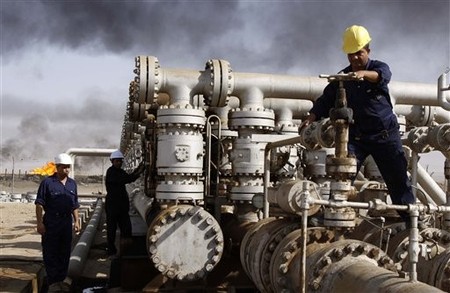Could the U.S. have gotten Iraq's oil onto market without war.

Walter Russell Mead claims the Iraq war was a strategic success:
But granted all that and more, and not forgetting the terrible human toll among Americans, allies and above all of the Iraqis themselves, there is one more thing about the Iraq War that students of foreign policy need to get clear in their heads: the strategic aims of the war have been largely achieved. Nine years after the invasion, an independent Iraq has a military that is linked to the United States. The Arab world is moving against the autocracies and incompetent kleptocracies that at once blocked development and generated waves of hate against the US and the west. The dangerous minorities of the Shiite and Sunni communities who are radical terrorists and nutjobs are more focused on their hatred of each other than on their hatred of us. The Sunni Arab world has united with the US against Iran and its allies. Despite the alienation caused by the Iraq War and the execrable way it was launched, our closest European and Arab allies are working more effectively and in a more united way against Iran than ever before.
I hope Mead's students at least contemplate some additional facts and analysis. The over-riding 'strategic aim' of the war was to deprive al-Qaeda a source of weapons of mass destruction and to remove an anti-American dictator from the Middle East. The first aim not only was not accomplished - since it was based on erroneous information and dubious reasoning - but was set back by the creation of al-Qaeda in Iraq. That threat, though greatly diminished, remains alive both inside Iraq and, increasingly, beyond its borders.
The second aim of the war was indeed accomplished. Maliki may have many faults, but he is no Saddam Hussein. At least, not today. But let's be honest: when it comes to Middle Eastern rulers and their relations with Washington, "friend" and "enemy" are rather fluid classifications.
But the cause of Mead's celebration was the news that Iraqi oil is finally coming back on the market. That's indeed great news. So it's worth asking a question: if getting that oil back onto global markets is a strategic boon, as both Mead and I would agree it is, were there easier ways to accomplish that than spending over a trillion dollars and killing tens of thousands of people?
After all, Iraqi oil wasn't flowing to global markets because of artificial barriers - namely, sanctions. Would the cost of lifting those sanctions have been worse for the U.S. than the second Iraq war? You could argue that Saddam would have used the oil revenue to rebuild his war machine and go on another rampage that would have cost the U.S. even more than the occupation - although that's difficult to fathom, given how the U.S. was able to dispatch Iraq's army in the first Gulf War, losing far fewer soldiers and spending hundreds of billions less than the second time around.
Ideally, U.S. policy should seek benefits at the lowest cost possible. I don't believe for a second that Hussein would have taken his improved economic fortunes and spent it on schools and clinics. But would the consequences of relaxed sanctions have been worse for the U.S. than the path the Bush administration chose? I'm not sure. There are no cost-free alternatives with this question. But certainly students of U.S. foreign policy ought to at least consider the possibility before accepting Mead's assertions.
(AP Photo)











